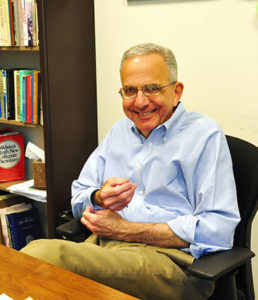Mary Beth Norton

Ronald Hoffman was the longest serving director of the Omohundro Institute.
Below are remembrance from colleagues. To share a remembrance of Ron, please contact Martha Howard (mxhowa@wm.edu).
Remembering Ron
Mary Beth Norton
Ron Hoffman and I were longtime friends, but I know I exasperated him the first time we met, which was sometime in the summer of 1967 at the Library of Congress Manuscript Division. He was finishing up research for his dissertation on the Revolution in Maryland. I was in the middle of my dissertation research on the loyalist exiles of the Revolution, just starting to tackle the library’s hundreds of reels of microfilm that document the work of the Loyalist Claims Commission, which met in London from 1782-1788. In addition, I was reading some original manuscripts in the library—for example, the papers of John Singleton Copley.
In those days at the Manuscript Division one signed in at the front desk and revealed on a form accessible to all researchers what topic one was working on. Either I sought out Ron in the reading room based on how he described his topic, or he did the same with me. So how did I exasperate him? I recall telling him I didn’t see how he could write about Maryland in the Revolution without looking at loyal Maryland exiles’ claims to the British government after the war. He was not pleased to hear that; I got the sense that he thought he had finished his research and was ready to write. (Indeed, I don’t think he followed my advice.)
Over the years we cultivated our friendship at numerous AHA and OAH conventions, and at the Institute’s parties, always a welcome part of those annual meetings as far as I was concerned. When he began to organize the U.S. Capitol Historical Commission’s scholarly meetings related to the bicentennial, he recruited me to participate in two: the one on women and the one on African Americans. For the latter, Ron put me together with Herb Gutman and Ira Berlin. The three of us wrote an article on African American families during the Revolution: I contributed my evidence on Jefferson’s enslaved families, Herb his analysis of the records of a Louisiana plantation, and Ira melded the two parts together. They made me the first named author, because the funding for the conference came from N.E.H., and I was on the N.E.H. council at the time, so I could not be paid, whereas they both received honoraria.
I was pleased when Ron was named to succeed Thad Tate as head of the Institute, and enjoyed the parties even more subsequently, because he always found creative sites for them. He also of course began the annual conferences, which have been so important in bringing older and younger scholars together. I served two terms on the council, once prior to his tenure and once (as chair) afterwards. In that role, I was pleased to work closely with Ron for the first time in our careers, and I gained even more appreciation him as a leader and chief fundraiser for the Institute. (He of course was the one who obtained funding from Malvern Omohundro.) I don’t think I ever exasperated him in that role.
But I did so once more when several of my students decided to organize a conference in my honor in September 2012. Ron and Sally came, but Ron was astonished to discover the conference did not mark my retirement. I recall several incredulous questions from him along the lines of, “you mean you aren’t retiring yet?” It seemed clear to me that he wouldn’t have attended had he not thought it was a retirement celebration. Even so, he acquired one of the T-shirts my students produced (logo: “I’m one of Liberty’s Daughters [and Sons]”) and later told me that he wore it regularly while jogging.
Despite his serious illness, I was glad to be able to see Ron (and say goodbye) during the conference in Williamsburg this past June. Now I’m retiring at last in December, and I’m sorry I can’t tell him that in person. And laugh with him about it at a party.
—Mary Beth Norton
